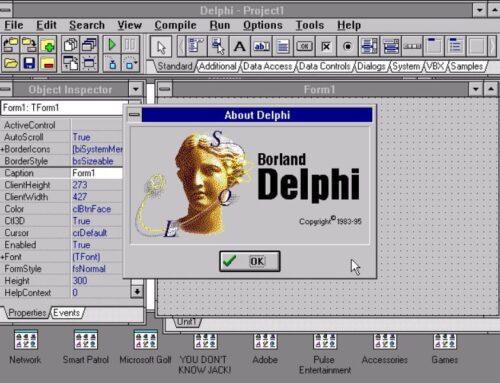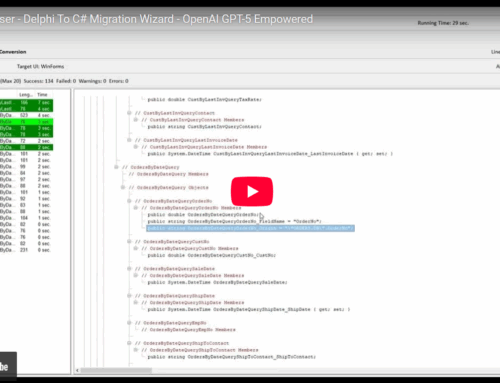Unlocking Legacy Modernization: How the AI-Enhanced Delphi to C# Migration Wizard Changes the Game
😫 Real Pain Points in Legacy Delphi Systems
- Lack of available Delphi developers in the job market
- Incompatible with modern toolchains, CI/CD pipelines, or cloud infrastructure
- Security risks from outdated components and limited patching
- Tightly coupled code and form logic, making testing and scaling difficult
- VCL-based UI cannot easily adapt to mobile or responsive needs
🚀 Why Migrate to C# (WinForms or WPF)
- Leverage the vast .NET ecosystem and developer base
- Modernize your UI with WinForms or XAML-based WPF
- Integrate cleanly with cloud services, APIs, and modern DevOps
- Improve maintainability, testability, and recruitment pipeline
- Future-proof your application with a forward-compatible platform
💡 Key Benefits of Using an AI-Assisted Migration Tool
- Automates 80–90% of code transformation
- Accurately converts .dfm forms into WinForms or WPF layouts
- Generates clean, idiomatic C# code with preserved logic
- Massively cuts cost, time, and risk compared to manual rewrites
- Built-in rule customization for handling edge cases and 3rd-party libraries
📈 ROI: Cost & Time Savings Breakdown
- Non-AI Automated migration: $150K+ for 1M lines, 9–18 months
- AI-assisted migration: $15K–$40K, completed in 2–4 months
- Average time savings: 75%+
- Average cost reduction: 70–80%
🤖 AI-Augmented Migration: What It Adds
📌 Key Enhancements via OpenAI Integration
| Traditional Wizard Capability | Now with OpenAI Assistance |
|---|---|
| Syntax translation only | Adds semantic translation of idioms and patterns |
| Hard-coded rule limitations | Uses natural-language understanding for context |
| 3rd-party library stubs only | AI generates functionally equivalent scaffolds |
| Weak comments/doc migration | Can convert Delphi comments into C#-style XML docs |
| UI components via mapping | AI auto-generates WinForms-compatible layouts |
| Manual cleanup of ambiguous logic | AI proposes equivalent C# expressions or patterns |
This transforms the wizard into a semi-intelligent translation assistant, rather than just a rule-based converter.
📊 Automation Estimates (with OpenAI vs. Without)
| Migration Task | Traditional Wizard Only | Wizard + OpenAI Integration |
|---|---|---|
| Syntax & control flow translation | ~95% automated | ✅ Same |
| Form (.dfm) to Designer.cs mapping | ~80% automated | ✅ Up to 90–95% |
| Event handlers & wiring | ~70% automated | ✅ 85–95% |
| Complex logic (e.g., pointers, nested records) | ~30% automated | 🔼 60–75% |
| 3rd-party library adaptation | ~10–15% automated | 🔼 50–70% (AI-generated scaffolds/stubs) |
| Comment & doc transformation | ❌ (none) | ✅ 80%+ with contextual accuracy |
| Global-to-OOP refactorings | ❌ Manual | 🔼 Partial suggestions via AI |
| Component replacements (custom controls) | ❌ Manual | 🔼 Often auto-generated equivalent |
Overall Net Automation:
-
Without AI: ~65–70%
-
With OpenAI: ~85–90% automation coverage (by volume of lines)
-
Remaining manual work: ~10–15% (mostly testing, domain-specific glue code, deep refactoring)
🔍 What Still Requires Manual Input
Despite the improvements, AI still needs developer oversight for:
-
Business logic understanding and domain-specific decisions
-
Migration of multi-threaded or real-time code
-
Architectural redesign (e.g., monolith → layered .NET)
-
Custom or legacy DB access components
-
Performance-sensitive parts (AI may not optimize)
🧠 How It Works Under the Hood
-
Delphi Parser’s static parser annotates code structure
-
Annotated blocks (e.g., procedures, class declarations) are fed into OpenAI with contextual prompts
-
The model returns C# equivalents, which are then injected into the output
.csfiles -
Post-processing ensures syntax integrity and wiring compatibility with WinForms or other targets
⏱️ Time & Cost Efficiency Gains With AI:
| Metric | Without AI | With AI Integration |
|---|---|---|
| Total migration time | 6–9 months | ⬇️ 2–4 months |
| Dev effort | ~800–1,200 hours | ⬇️ ~250–500 hours |
| Cost (est. at $60/hr) | $50K–$70K+ | ⬇️ $15K–$30K |
Especially impactful when:
-
Working with legacy Delphi apps with lots of 3rd-party components
-
Need to preserve business logic but modernize tech stack
-
Migrating many forms (UI layout + events + bindings)
✅ Summary
The OpenAI-enhanced Delphi Parser Wizard now offers:
-
True semi-intelligent migration for large Delphi codebases
-
Up to 90% automation coverage
-
Smart handling of 3rd-party libraries and complex logic
-
Rapid acceleration in both time and cost savings
 Addressing Enterprise Concerns: Is OpenAI Safe for Code Migration?
Addressing Enterprise Concerns: Is OpenAI Safe for Code Migration?
Many enterprises are understandably cautious about exposing sensitive source code to cloud-based AI platforms. But when it comes to using OpenAI for code migration, especially via the Delphi Parser integration, there are strong safeguards and industry precedents to support its safe and responsible use.
 Data Privacy & Usage Policy
Data Privacy & Usage Policy
As of 2023 and continuing into 2025, OpenAI offers API-based access where your data is not used for training or retained beyond request processing. When using the OpenAI API through a trusted tool like the Delphi Parser Wizard, your code:
- Is processed securely and in-memory
- Is not stored on disk or used for model training
- Is encrypted in transit via HTTPS
 Enterprise-Grade Controls
Enterprise-Grade Controls
For businesses with strict security needs, OpenAI provides dedicated infrastructure options through Azure OpenAI or private deployments. These services integrate with Microsoft’s compliance and data governance standards (SOC 2, ISO 27001, GDPR, HIPAA-ready, etc.).
 Estimated Cost for Azure OpenAI Integration
Estimated Cost for Azure OpenAI Integration
Enterprises opting to run OpenAI via Azure OpenAI Service (instead of OpenAI’s public API) can expect the following estimated costs for a dedicated migration workload:
- Model hosting: GPT-5 typically cost via Azure pricing tiers.
- 1M LOC migration: Typical usage $1000 for compute.
- Optional dedicated deployment: Azure AI Private Endpoints or managed clusters may incur monthly infrastructure costs ranging from about $5,000 depending on SLAs and scale.
- Security & compliance overhead: included in Azure’s enterprise offerings — no extra charge for meeting compliance standards.
While Azure OpenAI adds some cost compared to shared cloud APIs, it provides full control, security, auditability, and regional compliance — essential for highly regulated industries.
 Why You Should Still Consider OpenAI
Why You Should Still Consider OpenAI
- It dramatically reduces your project timeline and engineering overhead.
- It provides higher-quality, consistent code suggestions than traditional scripting or rule engines.
- It helps standardize modern .NET practices across your migrated codebase.
In short, OpenAI allows you to make the leap from legacy code to enterprise-ready architecture — fast, safe, and smart.
 The Evolution of OpenAI: A Trusted Standard
The Evolution of OpenAI: A Trusted Standard
OpenAI has been building state-of-the-art language models since 2018. From GPT-2 to GPT-5 (August 2025), each generation has made transformative strides in understanding, translating, and generating high-quality code. Today, OpenAI’s models are used by:
- Thousands of developers and teams worldwide
- Leading enterprises like Microsoft, Salesforce, Stripe, and Morgan Stanley
- Government, financial, and medical organizations under strict compliance
It’s no longer an experimental technology — it’s a global standard in enterprise AI, embedded in IDEs, productivity apps, and development pipelines worldwide.
For companies investing in modernization, OpenAI is not only safe — it’s strategic.
 Automation Comparison: With vs Without OpenAI
Automation Comparison: With vs Without OpenAI
| Migration Task | Without
OpenAI |
With
OpenAI |
|---|---|---|
| Syntax Translation | ~95% | ~95% |
| UI Layout Conversion (DFM) | ~80% | 90–95% |
| Event Handling & Wiring | ~70% | 85–95% |
| Complex Logic (Records, Pointers) | ~30% | 60–75% |
| 3rd Party Component Mapping | ~15% | 50–70% |
| Comment & Doc Conversion | None | ~80% |
| Total Effort Saved | ~60–70% | ~85–90% |
 Competitive Tool Comparison
Competitive Tool Comparison
| Tool | Automation Level | UI Support | 3rd Party Libraries | Estimated Cost | Time to Migrate |
|---|---|---|---|---|---|
| Manual Migration | 0–20% | Manual recreation | Manual rewriting | $150K–$300K | 12–24 months |
| Traditional Tools (e.g., VBUC) | 50–70% | WinForms only | Limited rule support | $40K–$100K | 6–9 months |
| Custom AI Pipeline | 60–80% | Partial | Manual tuning | $20K–$60K+ | 3–5 months |
| Delphi Parser + OpenAI | 85–90% | WinForms & WPF | AI scaffolds & mappings | $15K–$40K | 2–4 months |
 Final Thoughts
Final Thoughts
The Delphi to C# Migration Wizard with OpenAI integration isn’t just a better migration tool — it’s a strategic modernization accelerator. It bridges the gap between outdated legacy systems and maintainable, scalable .NET codebases. If you’re considering a Delphi migration in 2025, this is arguably the most powerful and cost-effective option available today.






